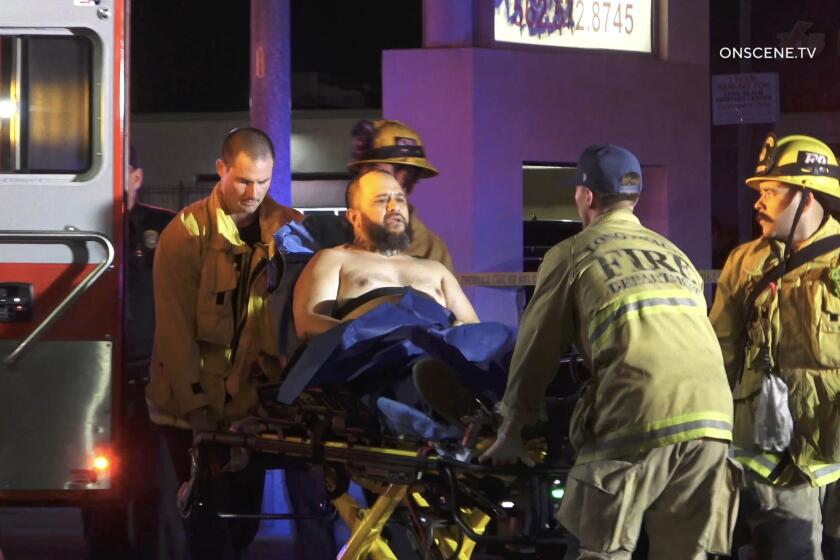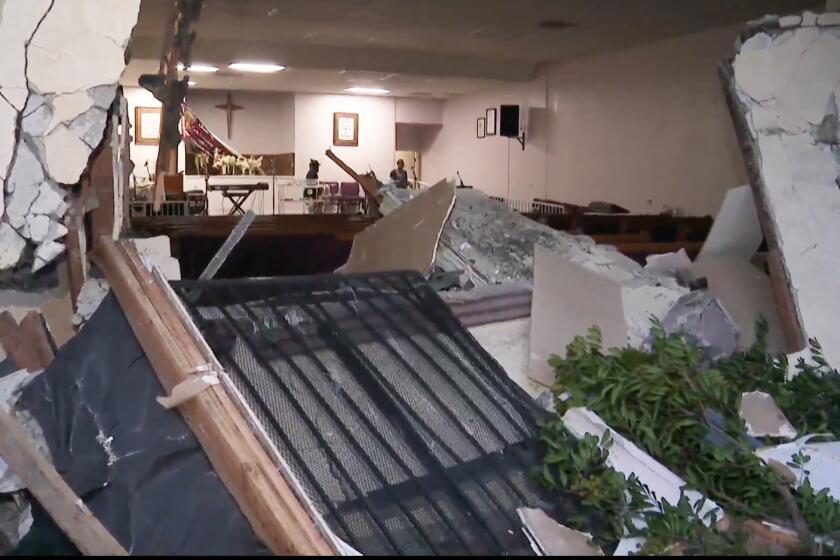Long Beach Police Reserves ‘meet a lot of people and get a chance to do some good.’
Most days, they work as sales people, security guards, teachers or as other professionals. But at least 20 hours a month, they wear uniforms, flash badges and use words like vehicle instead of car . Most strap on a gun.
They are the Long Beach Police Reserves, a group of 56 volunteers who look, sound, and--they say--think just like full-time police officers.
John F. McGill Jr., 50, has been on the reserve force longer than anyone else--21 years. During that time, he and his wife raised their six children, served as foster parents to 20 other children and more recently became family to several foreign exchange students.
McGill, who is a Long Beach building maintenance engineer, said reserve work “is fulfilling. You meet a lot of people and get a chance to do some good.”
The job is often routine, McGill and other reserves acknowledge. But they say nevertheless that life in a black-and-white police cruiser is a satisfying challenge and a contribution to the community.
For Art Pegg, the football coach at Western High School in Anaheim, being a reserve officer is just the latest chapter in his life as a community volunteer.
When his daughters were in school, Pegg helped out with Little League and various other children’s activities. But then, his girls entered their teens and came to rely on him less.
At first, Pegg, 46, filled the void by getting involved with the Republican Party--only to quickly learn that he is “very apolitical . . . I found out it doesn’t really matter who’s running the country.” In search of new volunteer work, he turned to the police reserves.
Wini Carter has a similar story. As a Neighborhood Watch block captain, she was called on to distribute brochures asking for police reserve applicants. After she found no takers, she decided to volunteer herself. At age 69, Carter is the oldest member of the reserves.
“Your conscience tells you to do it,” Carter explained.
A retired airline secretary, Carter spends much of her week doing other types of volunteer work, such as delivering meals to senior citizens.
Monday is her day to serve as a reserve officer, escorting women prisoners between the jail and the Long Beach Courthouse.
To become a reserve member, volunteers go through the same testing and background checks required of full-time officers, according to Sgt. Ronald Dvorak, who is in charge of the program.
Reserve officers must also graduate from the Police Academy, where they spend two nights a week and every Saturday of one semester. They pay $150 for their academy uniforms and devote a minimum of 20 hours--or two 10-hour shifts--each month. In addition, there are mandatory reserve meetings every other Tuesday.
The officers are put into one of three service divisions. Carter, for example, is a “Level 3,” which means she works unarmed and inside a building. A “Level 2” reserve works alongside a full-time police officer and is under his or her supervision. Only a “Level 1” officer, such as Pegg, is allowed to work on the street without direct supervision of a full-time officer. He can “do anything that a police officer can do,” Dvorak said.
Reserve members are legally considered police officers just while on duty, as opposed to full-time officers, who may carry their weapons at all times. And the volunteers tend to draw less glamorous tasks, such as managing crowds and traffic at parades, shows and other special events. They also work in patrol units and “wherever we need them,” Dvorak said.
The program saves the city money and serves as a link between residents and the department, according to Police Chief Lawrence Binkley. “It’s one of the finest partnerships with the community that the Police Department is involved in,” he said.
For the reserves, it is also an opportunity to see whether they want to be regular officers.
Officer Rick Montoya, for example, was a reserve for five years before he joined the force full time. While a reserve, he was a truck driver and a student preparing for medical school. “When I was a kid, I wanted to be either a police officer or a doctor,” Montoya, 35, said. He chose police, he said, after he “flunked financial aid.”
Others have no intention of leaving their jobs to join the force.
Howard L. Hagen, for example, has worked in the shipping industry for 25 years and “that’s hard to give up.” But the Wilmington resident finds police work exciting. “I’m a Vietnam veteran,” Hagen, 44, said. “I’ve been in a lot of fire fights. It’s just exciting. It gets your adrenaline going.”
“We help a lot of people and put the criminals behind bars,” Hagen said.
Nonetheless, the more serious crimes are usually handled by full-time police.
“If it’s a busy night, and there are no regular officers available, they’ll dispatch a reserve unit for a high priority call,” said Craig Braly, an executive in his family-owned pipe sales company. Braly and partner Reed Novisoff spend most of their shifts looking for drunk drivers. As he explained it: “We’re there to augment or support the police.”
More to Read
Start your day right
Sign up for Essential California for news, features and recommendations from the L.A. Times and beyond in your inbox six days a week.
You may occasionally receive promotional content from the Los Angeles Times.





